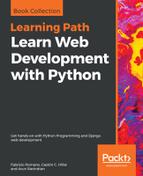I find Python's approach to operator overloading to be brilliant. To overload an operator means to give it a meaning according to the context in which it is used. For example, the + operator means addition when we deal with numbers, but concatenation when we deal with sequences.
In Python, when you use operators, you're most likely calling the special methods of some objects behind the scenes. For example, the a[k] call roughly translates to type(a).__getitem__(a, k).
As an example, let's create a class that stores a string and evaluates to True if '42' is part of that string, and False otherwise. Also, let's give the class a length property that corresponds to that of the stored string:
# oop/operator.overloading.py
class Weird:
def __init__(self, s):
self._s = s
def __len__(self):
return len(self._s)
def __bool__(self):
return '42' in self._s
weird = Weird('Hello! I am 9 years old!')
print(len(weird)) # 24
print(bool(weird)) # False
weird2 = Weird('Hello! I am 42 years old!')
print(len(weird2)) # 25
print(bool(weird2)) # True
That was fun, wasn't it? For the complete list of magic methods that you can override in order to provide your custom implementation of operators for your classes, please refer to the Python data model in the official documentation.
